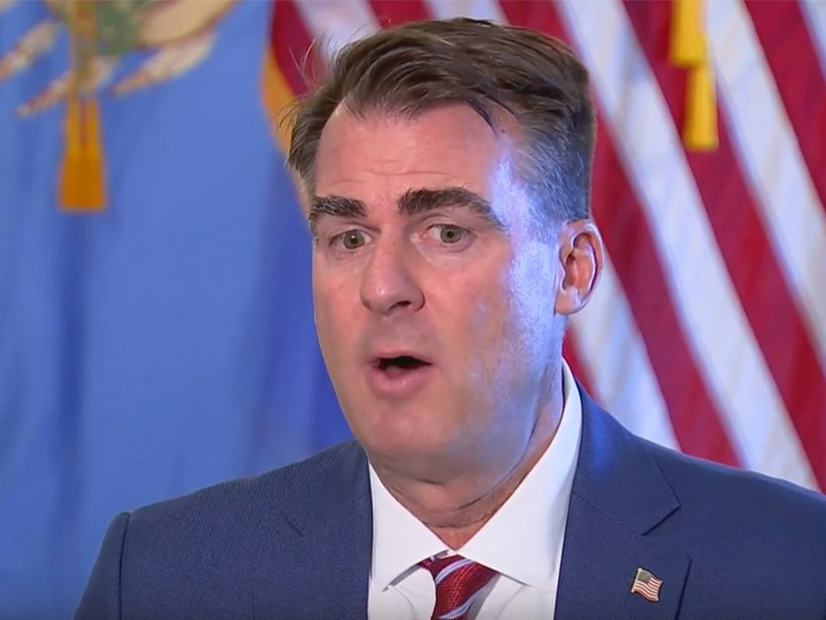Oklahoma Gov. Kevin Stitt’s (R) recent threat during a television interview to “unplug” from SPP may sound like political rhetoric designed to curry favor with his constituents, but the Arkansas-based grid operator is taking the statement seriously.
Calling himself the “most pro-oil and gas governor in the country,” Stitt told Oklahoma City political analyst Scott Mitchell during his local “Hot Seat” program that the “feds coming in demanding eminent domain” to build transmission lines is why he wants to “pull that back from the feds, pull back from SPP.”
“I just don’t want to have to play ‘Mother, may I’ to the Southwest Power Pool … before I add energy to my own grid,” Stitt said. “That’s where I have a problem with the Southwest Power Pool. So, I’m looking at unplugging from them.”
Stitt was apparently conflating the U.S. Department of Energy’s National Interest Electric Transmission Corridors (NIETCs) with SPP’s transmission work. One of those corridors, the 645-mile Delta-Plains corridor from Little Rock, Ark., through Oklahoma, drew strong political and public opposition in the state over eminent domain concerns.
“I won’t let anyone steamroll Oklahomans or their private property rights,” Stitt posted on X. “The feds don’t get to just come here and claim eminent domain for a green energy project that nobody wants.”
When the corridor was not included among the three corridors that advanced to the next phase, Stitt returned to X. “Good riddance. Another win for Oklahoma!” he crowed. (See DOE Cuts NIETC List from 10 to 3 High-priority Transmission Corridors.)
Still, his comments drew the attention of SPP. Staff have been working with Stitt ever since, providing a statement to Oklahoma media and clarifying that they have nothing to do with the NIETC process. They have also been working to answer a list of questions the governor has submitted to the RTO.
“We’re working to provide him the information he’s seeking, and we hope to provide that to him within the next several weeks,” COO Lanny Nickell, SPP’s newly minted CEO-in-waiting, told RTO Insider. (See related story, SPP Names COO Nickell to Replace Sugg as CEO.)
So, can Stitt unplug his grid from SPP? It would likely require legislation directing electric utilities to withdraw from the RTO. But that’s easier said than done.
First, there’s the matter of the substantial termination fees the state’s utilities would have to pay to leave SPP’s membership. Oklahoma would then have to figure out the construct under which to operate its own market and how to perform the services SPP currently provides. That would include reliability coordination, transmission planning and dispatch, crafting market rules and providing open access.
While incurring significant costs standing up a replacement to SPP, Oklahoma would also lose the benefits of belonging to a RTO, where costs are socialized among its members. The grid operator’s 2021 Value of Transmission study found that the $3.4 billion of new transmission projects placed in service between 2015 and 2019 will result in more than $27.2 billion in savings and benefits over the next 40 years, a benefit-cost ratio of 5.24.
Those numbers and other metrics are some of what SPP is providing to Stitt, Nickell said. He pointed out that every expansion of SPP’s membership has resulted from utilities, states and regulators determining that RTO membership provided significant net benefits through increased reliability, more affordable wholesale electricity and offering members’ input in developing solutions that benefit the entire footprint.
In the meantime, SPP is continuing to talk with Stitt’s office to “strengthen our mutual understanding” of how the RTO can continue to keep the state’s lights on “affordably and reliably,” Nickell said in his statement.
“We’ll continue to work with Gov. Stitt, as we do with all legislators and regulators across our service territory, to ensure the benefits of SPP membership continue to far outweigh the costs,” he said.




